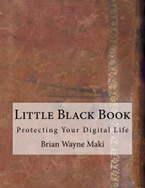Article first published as Book Review: Little Black Book: Protecting Your Digital Life by Brian Wayne Maki on Blogcritics.
July 5, 2012
Little Black Book: Protecting Your Digital Life
Brian Wayne Maki
CreateSpace (2012)
ISBN: 9781477539972
New Book Provides Practical Advice for Relieving Technology Frustration
 Brian Maki’s Little Black Book offers a common sense approach to dealing with the difficulties that technology has introduced into our lives. As a computer instructor and consultant for more than twenty years, Maki has seen how technology has made rapid changes in our lives to the point where we are addicted to being “connected” constantly, feel a lack of patience when we aren’t connected, and have been bombarded with spam email, computer frustrations, and worst of all, the threat of identity theft.
Brian Maki’s Little Black Book offers a common sense approach to dealing with the difficulties that technology has introduced into our lives. As a computer instructor and consultant for more than twenty years, Maki has seen how technology has made rapid changes in our lives to the point where we are addicted to being “connected” constantly, feel a lack of patience when we aren’t connected, and have been bombarded with spam email, computer frustrations, and worst of all, the threat of identity theft.
The book’s title refers to the need for us to keep track of our digital life through a non-digital, old-fashioned means—preferably a paper book in which we write all our usernames and passwords, along with keeping a record of any changes we make to our accounts. While Maki also admits a flash drive can serve this purpose, he cautions that flash drives are subject to viruses themselves, and keeping track of passwords on a computer leaves them available to hackers and viruses.
But what sets this book apart the most is that it ties in with the significance of end-of-life planning. After telling the story of William Weber, a man whom Maki helped to organize his digital life before his death, Maki highlights how few of us think about what will happen to our digital life and online identity after we have died. He offers practical advice for monitoring our digital life and planning for closing out accounts to protect against identity theft even after our deaths.
This short book is valuable for focusing on a subject most people never think about. Maki covers numerous topics that will result in helping us to protect our identities, our possessions, our freedom, and overall, our happiness. As Maki states:
“You must reexamine how you interact with the Internet, what you share, why you share it, and learn never to follow the path of Internet trust again. And not trusting the powers that control this information is a big step toward freedom and individuality, a life that you own and that is your right to administer as an American, not for someone else to abuse, to sell, and to leave out in cyber world forever. It is your digital life to control.”
As Maki points out, technology is going to be with us for the rest of our lives—it’s not going away—so we actively must learn to control it and protect ourselves from it, putting it in its proper place as necessary only to help us, rather than letting it continue to control our lives. I certainly feel the importance of this need, and I hope other readers will as well.
For more information about Brian Maki and Little Black Book, visit www.mc-computerhelp.com, www.amazon.com (search for Brian Maki), or https://www.createspace.com/3889991.
— Tyler R. Tichelaar, Ph.D. and award-winning author of “Narrow Lives”

